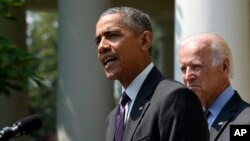In 1961, Wayne Smith was a young diplomat on his first foreign posting in Havana, and his final duties included shutting down the U.S. Embassy, destroying documents and helping evacuate Americans.
Relations between the U.S. government and Fidel Castro had soured after the Cuban leader declared himself a Marxist-Leninist, confiscated billions of dollars in American-owned property, nationalized private businesses, closed down newspapers and imprisoned untold numbers of political opponents.
Smith boarded a ferry, the last to leave Havana harbor carrying U.S. Embassy personnel to Florida. From the deck, he saw the concrete embassy tower on the Havana waterfront slowly disappear on the horizon.
Smith recalls how the embassy’s Cuban employees bid farewell to the ferry.
“They turned the lights on and off, floor by floor,” he said.
At the time, Smith believed the spat would be resolved within weeks or months. His interactions with Cubans taught him any differences could only be political and superficial.
"I really think we have a feel for the Cuban people and the Cuban people have a certain tie, a feel for Americans. We get along,” the former diplomat, now in his 80s, told VOA.
54 years
He did not imagine it would be 54 years before the president of the United States would order the American flag raised again at the old embassy building in Havana.
That day came Wednesday, when Obama stood in the White House Rose Garden and formally announced the restoration of diplomatic ties.
"A year ago, it might have seemed impossible that the United States would once again be raising our flag, the stars and stripes, over an embassy in Havana. This is what change looks like,” the U.S. leader said.
That change has been the result of months of secret negotiations between U.S. and Cuban delegations that culminated in December with the decision to resume diplomatic relations.
The decision was reaffirmed in April when Obama met with Cuban President Raúl Castro on the sidelines of the Summit of the Americas in Panama.
A remaining obstacle was removed in May, when the U.S. Department of State took Cuba off its list of state sponsors of terrorism.
Cuba's human rights record
But critics say one fundamental change that has not occurred is in regard to Cuba’s human rights record.
Even as Obama and Castro were preparing to meet in Panama, video cameras captured images of agents beating, kicking and pushing Cuban dissidents during a demonstration outside the Cuban Embassy in Panama City. Witnesses said the attackers came from inside the embassy.
Cuban police continue to detain dissidents and the Internet remains off-limits to most Cubans.
Obama believes exposure to American visitors, trade with American businesses, and cultural exchanges will help bring about change.
The president’s announcement Wednesday came after the Cuban government in January released 53 political prisoners it had promised to free in return for the rapprochement.
“Nobody expects Cuba to be transformed overnight,” Obama said Wednesday. “But I believe that American engagement – through our embassy, our businesses, and most of all, through our people – is the best way to advance our interests and support for democracy and human rights.”
But opponents, including some in Congress and among the Cuban-American exile community, believe that view is naive, and they accuse the Obama administration of not demanding enough guarantees in exchange for diplomatic recognition.
They also question whether the policy will be sustainable.
While Obama’s goals are freedom, prosperity and liberalization on the island, the Castro government has neither made promises to allow for political dissent or to hold free and fair elections, nor has it promised to open the Internet and make it accessible to all Cubans.
Historically, many in Latin America have criticized the United States for supporting repressive leaders in the region, including Fulgencio Batista, the Cuban ruler deposed by Castro in 1959.
Embargo persists
Some critics say that by recognizing the Castro government before it makes substantial reforms and seeking to expand U.S. corporate and cultural influence in Cuba, the United States risks falling into the same pattern that Obama is seeking to break.
“I am afraid that the president is going to have to get used to seeing his picture with Raúl Castro in that collection of infamous photographs with Latin American dictators,” said Frank Calzón, head of the Center for a Free Cuba, an anti-Castro organization in Washington.
With the break in relations five decades ago came the U.S. economic embargo, which only the U.S. Congress can lift.
A vote to end the embargo appears unlikely, and Obama is pushing ahead with the normalization efforts on his own.
Senior White House officials on Wednesday said the administration is not concerned about funding for the new embassy, and signaled that the State Department plans to shift funds within existing budgets to pay for the additional staffing required to transition the existing U.S. Interests Section in Havana into an embassy.
The new embassy will occupy the original building that the U.S. evacuated in 1961 and which, since 1977, has housed the interests section.
The administration also does not immediately plan to name an ambassador to Cuba, in order to avoid having the nomination blocked in the Senate confirmation process.
Instead, Jeffrey DeLaurentis, the current chief of mission at the U.S. Interests Section in Havana, will function as ambassador for the time being.
Smith applauds Obama’s push to normalize ties with the Cubans, an action he says is long overdue.
“The more we engage with them, the better. Standing off and just having a hostile attitude doesn’t help anything – it hasn’t over 50 years!” he said.




